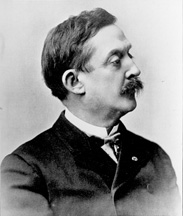Matthew Quay
Matthew Stanley Quay (born September 30, 1833 in Dillsburg , York County , Pennsylvania , † May 28, 1904 in Beaver , Pennsylvania) was an American politician . Between 1887 and 1899 and again from 1901 to 1904 he represented the state of Pennsylvania in the US Senate .
Career
Matthew Quay attended public schools in his home country. In 1850 he graduated from Jefferson College in Washington, Pennsylvania. After that he worked as a teacher for some time. After a subsequent law degree and his admission as a lawyer in 1854, he began to work in Beaver in this profession. Between 1856 and 1860 he held the legal office of prothonotary in Beaver County . During the civil war he was used in various functions as an officer for the Union . He was Colonel of the Pennsylvania Volunteer Forces. For his military achievements he received the Congressional Medal of Honor in 1888 .
Politically, he joined the Republican Party . Between 1865 and 1867 he was a member of the Pennsylvania House of Representatives . From 1867 to 1872 he published the Beaver Radical newspaper. He was then twice as Secretary of Commonwealth executive officer of the state government of Pennsylvania: from 1872 to 1878 and between 1879 and 1882. In between he was in the years 1878 and 1879 for the city of Philadelphia as a registrar ( recorder ). In 1886 and 1887, he succeeded William Livsey as Treasurer of his state. In the years after the Civil War, Quay in Pennsylvania gained more and more influence over the Republican Party there. Soon he rose to the top of the hierarchy and became the third Republican party leader in Pennsylvania after Simon Cameron and his son James . He was generally referred to as the boss who at times fully directed the party machinery. In 1888 he led Benjamin Harrison's presidential campaign . In the same year he also became chairman of the Republican National Committee , the Republican party organization, which he remained until 1891.
In 1887 Quay was elected to the US Senate, where he succeeded John I. Mitchell on March 4 . After being re-elected, he was able to complete two full six-year terms there until March 3, 1899. In 1896 he unsuccessfully sought his party's nomination for the presidential election . This went to William McKinley . Around this time his influence began to decline somewhat. He faced allegations of misappropriation of funds in Pennsylvania. Although he was acquitted; The resulting political damage meant that he could no longer find a majority for re-election in the state legislature that elected the US Senators from Pennsylvania at the time. However, one could not agree on any other candidate there either. As a result, Governor William A. Stone intervened and again appointed Quay a US Senator to keep the mandate occupied. That had a bitter aftertaste, because Quay had given massive support to the governor's election campaign and the appointment was now viewed in return. The Senate rejected Quay's appointment and denied him his seat, which subsequently remained vacant between 1897 and 1901. In 1901 there was a majority for Quay in the by-election, who then moved back to the Senate on January 15 of that year and was able to hold the mandate until his death on May 28, 1904. During his tenure in Congress , Quay chaired several committees.
Web links
- Matthew Quay in the Biographical Directory of the United States Congress (English)
- Matthew Quay in the database of Find a Grave (English)
- Matthew Quay in the nndb (English)
| personal data | |
|---|---|
| SURNAME | Quay, Matthew |
| ALTERNATIVE NAMES | Quay, Matthew Stanley (full name) |
| BRIEF DESCRIPTION | American politician |
| DATE OF BIRTH | September 30, 1833 |
| PLACE OF BIRTH | Dillsburg , Pennsylvania |
| DATE OF DEATH | May 28, 1904 |
| Place of death | Beaver , Pennsylvania |


